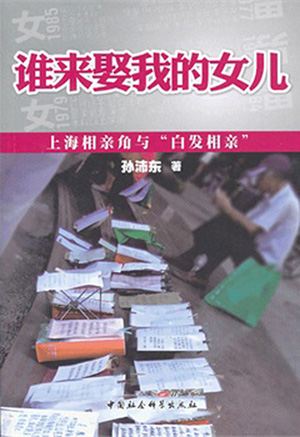"Anxiety has become a common phenomenon in much of Chinese society; we live in an environment that fosters mutual distrust, we worry excessively, and then we constantly search for temporary relief from this anxiety which in turn makes the situation even worse."
So says PhD Sun Peidong, in her newly published book Who Will Marry My Daughter?
From September 2007 to June 2008, the sociology teacher from East China University of Political Science and Law devoted herself to observing and talking with many of these "anxious" citizens, most of them parents of unmarried young people in
Long investigation
The matchmaking corner of the title has been taking place in People's Park near People's Square every Saturday and Sunday since 2005, and regularly attracts hundreds of people.
However, during her long investigation, Sun learned of only three couples that were successfully matched there, one of which she interviewed for the book.
The book details 65 individual cases, and examines the institutional and contextual analysis of this parental matchmaking phenomenon. Sun also looks into the reasons why the corner remains so popular, despite its seemingly poor success rates.
This is thought to be the first academic study that focuses on urban matchmaking corners in
GT: Why did you want to conduct this investigation?
Sun: I was astonished when I came across this matchmaking corner in the park. The custom of parents finding spouses for their children belongs to a feudal society, so how can such a thing exist in an open, modern and international metropolis like
GT: You did in-depth interviews with 43 parents and 15 unmarried young men/women and it took more than four years to finish the book. Did you come up against any obstacles, or even resistance, to the project?
Sun: As I was finishing the investigation in 2009, I was criticized by some scholars who thought it wasn't "worthwhile" for a scholar to look into the matchmaking corner. They thought this was the job of journalists.
But I persisted in finishing the research and the book, because personally I really wanted to find the reason for the corner's failure. I hoped the explanation might relieve the anxiety of some of those worried parents. One conclusion of my book is that so-called shengnü (leftover women, widely accepted as referring to never-married women over 27) is actually a false reality created by a patriarchal society, and some sensationalist media outlets. I hope this conclusion be of comfort to parents.
Other scholars, however, have given me great support including Professor Deborah Davis from Yale University and Professor Yang Guobin from the
GT: Did your research throw up any unexpected findings?
Sun: Yes. I really didn't expect these senior citizens to be so burdened by the marital status and problems of their children. 70 percent of the older interviewees belong to the generation of zhiqing, meaning educated youths born in cities between 1947 and 1959 and who were part of the Down to the Countryside Movement during the Cultural Revolution (1966-76).
This earth-shattering upheaval in their life gave them a heightened awareness of potential dangers in life, and fretting over the postponed marriages of their children is one manifestation of this deep-seated fear that things could go terribly wrong. Therefore, they will urge their children to marry someone who is well-educated and who already has an apartment; they believe this will guarantee stability for their child's future.
Also, it was interesting to discover the latent, or indirect, functions of the matchmaking corner that also account for its ongoing popularity. The corner has become a platform for zhiqing to communicate, to share helpful information about their daily lives, and even to find a better half for themselves. Non-Shanghainese parents have an opportunity to connect to the city and its wider activities, while unmarried men and women can also find friends, if not spouses, via the corner.
GT: What does the corner say about wider Chinese society?
Sun: Barriers between the differing social classes have been reinforced as most people at the matchmaking corner tend to look for future spouses in the same social ranks as themselves, in terms of educational background, wealth and networking resources.
Urban families are largely well adapted to the country's market-oriented economy. They are aware of the importance of economic factors in their everyday lives.
Also I've found that the notion of "individualism" has new meanings in

The cover of Who Will Marry My Daughter?

A father writes down the personal information posted in People's Park
Photo: Cai Xianmin/GT
